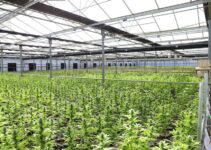I'm exploring the THC content in hemp strains and what it means for farmers. From legal implications to cultivation techniques, I'll cover it all. Let's dive into the world of Delta 8 THC and understand its levels, production, and future trends.
Key Takeaways
- Legal THC limits for hemp vary by country and state, and compliance with these limits is crucial for hemp farmers to avoid legal implications.
- Extraction methods and genetic factors play a crucial role in the production of Delta 8 THC in hemp strains.
- Market demand and consumer preferences influence the cultivation of hemp strains with lower THC content.
- Testing and regulatory compliance are essential to ensure the safety and quality of hemp products.
The Basics of Delta 8 THC
As a hemp enthusiast, I've been curious about the distinct properties of Delta 8 THC and its potential benefits. Delta 8 THC is typically derived from CBD through various extraction methods such as distillation or isolation. These methods are used to concentrate and purify the Delta 8 compound, ensuring its potency and purity. One of the most intriguing aspects of Delta 8 THC is its potential health benefits. Some studies suggest that Delta 8 THC may possess anti-nausea, anti-anxiety, and appetite-stimulating properties, making it a promising therapeutic compound. Additionally, Delta 8 THC is reported to offer a smoother, milder high compared to Delta 9 THC, which could make it more appealing to individuals sensitive to the potent effects of traditional THC. These unique properties make Delta 8 THC an exciting area of exploration within the hemp and cannabis industry.
Legal Implications for Hemp Farmers
As a hemp farmer, understanding the legal THC limits for hemp is crucial. It directly impacts the sale of my crops and can have significant implications for my business. Navigating these legal implications requires a clear understanding of the regulations and how they apply to my farming practices.
Legal THC Limits for Hemp
After researching the legal THC limits for hemp, I found that it's crucial for hemp farmers to understand the regulations to avoid potential legal implications. The legal THC limits for hemp vary by country and state, and staying compliant is essential for the success of our farms. It's frustrating to navigate through constantly changing regulations and fear the consequences of unknowingly violating THC content regulation. The ambiguity surrounding legal THC limits adds unnecessary stress and uncertainty to our already challenging profession. The fear of inadvertently exceeding the hemp THC limits and facing legal repercussions is a heavy burden to bear. We need clear and consistent guidelines to alleviate the anxiety and confusion surrounding THC content regulation.
Impacts on Crop Sales
Navigating the legal implications of hemp THC content on crop sales is essential for farmers to ensure compliance and avoid potential repercussions. Hemp farmers must be aware of the legal THC limits to prevent their crops from exceeding the allowed threshold. Exceeding the legal limit can result in the destruction of the entire crop, leading to significant financial losses. Additionally, market trends play a crucial role in determining the demand for hemp crops with lower THC content. Farmers need to consider market demands and consumer preferences when selecting hemp strains to cultivate. Moreover, crop yield is a key factor in the sales of hemp. Understanding the relationship between THC content and crop yield is imperative for farmers to make informed decisions that align with both legal requirements and market demands.
| Legal Implications | Considerations |
|---|---|
| THC content limit | Market demand |
| Crop destruction | Consumer preferences |
| Compliance | Crop yield |
Understanding Delta 8 THC Levels
How exactly do hemp strains differ in their Delta 8 THC levels, and what are the implications for consumers like me? It's crucial to understand the varying Delta 8 THC levels to make informed decisions. Here are some key points to consider:
- Understanding extraction methods: Knowing how Delta 8 THC is extracted can influence the overall quality and purity of the product, impacting its effectiveness and safety.
- *Emotional response*: Feeling reassured about the safety and quality of the products I consume brings peace of mind and confidence in my choices.
- Consumer preferences: Recognizing the diversity in consumer preferences can help tailor the availability and variety of Delta 8 THC products to better meet individual needs.
- *Emotional response*: Feeling understood and catered to as a consumer enhances my overall satisfaction and trust in the industry.
- Genetic modification, environmental impact: Understanding the genetic makeup of hemp strains and their environmental impact can influence the sustainability and ethical considerations of Delta 8 THC production.
- *Emotional response*: Knowing that the products I choose have minimal environmental impact and are ethically produced brings a sense of responsibility and pride in supporting sustainable practices.
Factors Affecting Delta 8 THC Content
Considering the factors affecting Delta 8 THC content is crucial for understanding the overall quality and effectiveness of hemp strains. Farming practices play a significant role in determining the Delta 8 THC levels in hemp. Factors such as the use of organic fertilizers, proper irrigation, and sustainable farming methods can influence the cannabinoid profile of the plant. Additionally, environmental factors like climate, soil composition, and sunlight exposure also impact the Delta 8 THC content in hemp strains. For instance, hemp plants grown in optimal conditions with adequate sunlight and well-drained, nutrient-rich soil tend to have higher Delta 8 THC levels. Understanding and controlling these factors are essential for hemp farmers to cultivate strains with consistent and desirable Delta 8 THC content, ensuring the production of high-quality hemp products.
Testing and Compliance for Hemp Strains
I oversee the testing and compliance processes for hemp strains to ensure regulatory adherence and product quality. When it comes to testing methods, we utilize state-of-the-art technology to accurately measure the THC content in hemp strains, providing transparency and assurance to our consumers. Regulatory compliance is non-negotiable for us; it's not just about following rules, but about ensuring the safety and reliability of our products. Our commitment to regulatory compliance means that every batch of hemp strains undergoes rigorous testing to meet the highest industry standards. This dedication is not just about meeting requirements; it's about delivering a product that consumers can trust. We take pride in our compliance efforts because it means we're providing the best and safest hemp strains for our customers.
Market Demand for Delta 8 THC
As I explore the market demand for Delta 8 THC, it's evident that its popularity is on the rise. This surge in interest has raised questions about its legal status and implications within the industry. Understanding the factors driving this demand and the legal landscape surrounding Delta 8 THC is crucial for both consumers and businesses.
Rising Delta 8 Popularity
With the increasing market demand for Delta 8 THC, it's evident that consumers are seeking alternative cannabinoids with unique properties. As delta 8 extraction methods become more refined, its appeal grows among individuals looking for a milder psychoactive experience. The rising popularity of Delta 8 THC can be attributed to several factors:
- Health Benefits: Many users report that Delta 8 THC provides a clearer and more functional high, making it suitable for daytime use without the sedative effects often associated with Delta 9 THC.
- Legal Considerations: With evolving regulations, Delta 8 THC offers a legal alternative for those in states where Delta 9 THC remains prohibited.
- Novelty and Curiosity: The distinct effects of Delta 8 THC spark curiosity and attract individuals looking for a fresh cannabis experience.
Legal Status Implications
My interest in the legal status implications of Delta 8 THC's market demand heightened as I observed its increasing popularity and the evolving regulations surrounding cannabis products. The legal challenges surrounding Delta 8 THC are complex and varied. While the 2018 Farm Bill legalized hemp-derived cannabinoids, including Delta 8 THC, its status is still subject to state-specific regulations, leading to uncertainty and inconsistency in its legality. This has created confusion for both consumers and businesses operating in the cannabis industry. Furthermore, consumer perceptions of Delta 8 THC's legality impact market demand. As consumers become more aware of the legal ambiguities and potential risks, their purchasing decisions may be influenced. Addressing these legal challenges and providing clear guidelines for the production and sale of Delta 8 THC products is crucial for ensuring market stability and consumer confidence.
Cultivation Techniques for High Delta 8 THC
To achieve high Delta 8 THC content in hemp strains, I employ advanced cultivation techniques that prioritize the optimal development of cannabinoid-rich trichomes.
- Soil Nutrients: I meticulously monitor and balance the soil nutrients to ensure the plants receive the ideal blend of minerals and organic matter, promoting robust trichome production.
- Light Exposure: I implement strategic light exposure schedules, harnessing the power of natural sunlight and supplementary lighting to maximize trichome development, resulting in higher Delta 8 THC levels.
- Precision Care: Each plant receives individualized care, fostering a connection that drives me to cultivate the highest quality hemp with elevated Delta 8 THC content.
These techniques not only enhance Delta 8 THC production but also reflect my dedication to producing top-tier hemp strains. Now, let's delve into the role of genetics in Delta 8 THC production.
Genetics and Delta 8 THC Production
When it comes to the production of Delta 8 THC in hemp strains, genetics play a crucial role. Certain genetic variations can influence the synthesis of Delta 8 THC and impact the overall THC content in hemp. Understanding the genetic factors involved in Delta 8 synthesis is essential for regulating THC levels in hemp strains and ensuring compliance with legal standards.
Hemp Strain Genetics
I've discovered that hemp strain genetics play a crucial role in the production of Delta 8 THC. The breeding techniques and genetic modification used in hemp strain genetics directly impact cannabinoid production, including the levels of Delta 8 THC. It's fascinating to see how specific genetic traits can be selectively bred to enhance the production of Delta 8 THC in hemp strains. This not only highlights the scientific complexity of hemp genetics but also raises ethical considerations around genetic modification. Understanding the intricate interplay between hemp strain genetics and Delta 8 THC production evokes a sense of wonder about the natural world and the potential for scientific advancement. It also sparks thought-provoking discussions about the implications of genetic manipulation in hemp cultivation.
Delta 8 Synthesis
How exactly do specific genetic traits affect the production of Delta 8 THC in hemp strains? The synthesis methods and regulatory challenges play a crucial role in understanding the genetic factors influencing Delta 8 THC production. Synthesis methods determine the efficiency of converting CBD into Delta 8 THC, with specific genetic traits influencing the rate and extent of this conversion. Regulatory challenges also impact the genetic selection of hemp strains for Delta 8 THC production, as certain genetic traits may be subject to legal restrictions or requirements. Understanding the interplay between genetics, synthesis methods, and regulations is essential for optimizing Delta 8 THC production in hemp strains. Now, let's delve into the subsequent section about 'THC content regulation' to further explore the implications of these factors on the industry.
THC Content Regulation
In considering THC content regulation in hemp strains, a comprehensive understanding of the genetic factors influencing Delta 8 THC production is crucial.
- Genetic Variability: The complex interplay of genetic factors contributes to the varying levels of THC and Delta 8 THC in different hemp strains, highlighting the need for precise regulation.
- Consumer Safety: Implementing stringent THC testing standards ensures that consumers can trust the consistency and reliability of hemp products, promoting confidence in the industry.
- Legal Compliance: Clear regulations regarding THC content in hemp strains are essential for ensuring compliance with local laws, providing a framework for both producers and consumers to navigate the market confidently.
Understanding the intricate relationship between genetics and THC content regulation is vital in shaping the future of hemp production and consumption.
Sustainability in Delta 8 THC Farming
When exploring sustainability in Delta 8 THC farming, prioritizing environmentally friendly practices is crucial for long-term viability. Sustainability practices encompass various methods that minimize the environmental impact of farming while promoting economic viability. Here's a table showcasing some sustainable farming practices and their environmental benefits:
| Sustainable Practice | Environmental Impact |
|---|---|
| Crop Rotation | Reduces soil erosion and increases soil fertility |
| Organic Pest Control | Minimizes chemical pollution and preserves biodiversity |
| Water Conservation | Reduces water usage and minimizes strain on local water sources |
| Renewable Energy Usage | Lowers greenhouse gas emissions and decreases reliance on non-renewable resources |
| Minimal Tillage | Preserves soil structure and reduces carbon footprint |
Implementing these sustainable practices not only ensures the environmental health of the farming process but also contributes to the long-term success of Delta 8 THC farming.
Future Trends in Delta 8 THC Research
Continuing our exploration of sustainability in Delta 8 THC farming, I will now delve into future trends in Delta 8 THC research.
- The potential for uncovering new therapeutic applications of Delta 8 THC through advanced research methods is incredibly exciting. This could lead to the development of more targeted and effective products for consumers with specific needs.
- Understanding consumer preferences and behaviors will be crucial for guiding future research efforts. This will ensure that the industry can meet the evolving demands of consumers and provide products that align with their preferences.
- Exploring the long-term effects of Delta 8 THC consumption on human health and wellness is a key aspect of future research. This will help to solidify its position within the market and provide consumers with confidence in its safety and efficacy.
Frequently Asked Questions
Can I Legally Sell Hemp Strains With High Delta 8 THC Content in All States?
Legally selling hemp strains with high delta 8 THC content in all states involves considering market demand, consumption implications, and regulatory compliance. It's essential to understand the legal implications and ensure compliance with state laws.
Are There Any Environmental Concerns Associated With Cultivating Hemp Strains With High Delta 8 THC Levels?
There are potential environmental impacts associated with cultivating hemp strains with high delta 8 THC levels, which must be considered alongside cultivation regulations. It's important to ensure sustainable and responsible agricultural practices.
How Does the Demand for Delta 8 THC Compare to Other Cannabinoids in the Market?
The demand for Delta 8 THC in the market is growing rapidly compared to other cannabinoids. It's important to consider long term effects and environmental impact as this trend continues.
What Are the Potential Long-Term Implications of Consuming Hemp Strains With High Delta 8 THC Content?
Consuming hemp strains with high delta 8 THC content may have potential health effects. It's crucial for consumer awareness to understand the long-term implications. Educating ourselves about the risks and benefits is essential.
Are There Any Specific Regulations or Guidelines for Testing and Compliance With Delta 8 THC Levels in Hemp Strains?
Testing guidelines and compliance regulations for delta 8 THC levels in hemp strains vary by state. It's important to stay informed about the specific requirements in your area to ensure legal compliance and product safety.
Conclusion
In conclusion, understanding the THC content in hemp strains, specifically Delta 8 THC, is crucial for hemp farmers and consumers. Factors such as genetics, cultivation techniques, and testing play a significant role in determining the levels of Delta 8 THC. As the industry continues to evolve, it is important to stay updated on legal implications and future trends in Delta 8 THC research to ensure compliance and sustainability in hemp farming.





